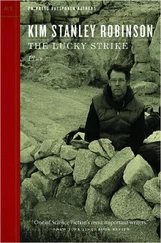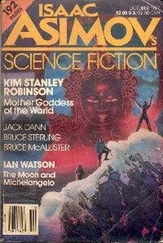The Martians
by Kim Stanley Robinson


Chapter 1
Michel in Antarctica
At first it was fine. The people were nice. Wright Valley was awesome. Each day Michel woke in his cubicle and looked out his little window (everyone had one) at the frozen surface of Lake Vanda, a flat oval of cracked blue ice, flooding the bottom of the valley. The valley itself was brown and big and deep, its great rock sidewalls banded horizontally. Seeing it all, he felt a little thrill and the day began well.
There was always a lot to do. They had been dropped there in the largest of the Antarctic dry valleys with a load of disassembled huts and, for immediate occupancy, Scott tents. Their task through the perpetual day of the Antarctic summer was to build their winter home, which on assembly had turned out to be a fairly substantial and luxurious modular array of interconnected red boxes. In many ways it seemed analogous to what the voyagers would be doing when they arrived on Mars, and so of course to Michel it was all very interesting.
There were 158 people there, and only a hundred were going to be sent on the first trip out, to establish a permanent colony. This was the plan as designed by the Americans and Russians, who had then convened an international team to implement it. So this stay in Antarctica was a kind of test, or winnowing. But it seemed to Michel that everyone there assumed he or she would be among the chosen, so there was little of the tension one saw in people doing job interviews. As they said, when it was discussed at all—in other words when Michel asked about it—some candidates were going to drop out, others would be invalided out, and others placed on later trips to Mars, at worst. So there was no reason to worry. Most of the people there were not worriers anyway—they were capable, brilliant, assured, used to success. Michel worried about this.
They finished building their winter home by the fall equinox, March 21. After that the alternation of day and night was dramatic, the brilliant slanted light of the days ending with the sun sliding off to the north and over the Olympus Range, the long twilights leading to a black starry darkness that eventually would be complete, and last for months. At their latitude, perpetual night would begin a little after mid-April. The constellations as they revealed themselves were the stars of another sky, foreign and strange to a northerner like Michel, reminding him that the universe was a big place. Each day was shorter than the one before by a palpable degree, and the sun burned lower through the sky, its beams pouring down between the peaks of the Asgaard and Olympus Ranges like vibrant stagelights. People got to know each other.
When they were first introduced, Maya had said, “So you are to evaluate us!”—with a look that seemed to suggest this could be a process that went both ways. Michel had been impressed. Frank Chalmers, looking over Maya’s shoulder at him, had seen this.
They were a mix of personality types, as one might expect. But they all had the basic social skillfulness that had allowed them to make it this far, so that whether outgoing or withdrawn in their basic nature, they could still all talk easily. They were interested in each other, naturally. Michel saw a lot of relationships beginning to bloom around him. Romances too. Of course.
To Michel all the women in camp were beautiful. He fell a little in love with a lot of them, as was his practice always. Men he loved as elder brothers, women as goddesses he could never quite court (fortunately). Yes: Every woman was beautiful, and all men were heroes. Unless of course they weren’t. But most were; this was humanity’s default state. So Michel felt; he always had. It was an emotional setting that cried out for psychoanalysis, and in fact he had undergone analysis, without changing this feeling a bit (fortunately). It was his take on people, as he had said to his therapists. Naive, credulous, obtusely optimistic—and yet it made him a good clinical psychologist. It was his gift.
Tatiana Durova, for instance, he thought as gorgeous as any movie star, with also that intelligence and individuality that derived from life lived in the real world of work and community. Michel loved Tatiana.
And he loved Hiroko Ai, a remote and charismatic human being, withdrawn into her own affairs, but kind. He loved Ann Clayborne, a Martian already. He loved Phyllis Boyle, sister to Machiavel. He loved Ursula Kohl like the sister he could always talk to. He loved Rya Jimenez for her black hair and bright smile, he loved Marina Tokareva for her tough logic, he loved Sasha Yefremova for her irony.
But most of all he loved Maya Toitovna, who was as exotic to him as Hiroko, but more extroverted. She was not as beautiful as Tatiana, but drew the eye. The natural leader of the Russian contingent, and a bit forbidding—dangerous somehow—watching everyone there in much the same way Michel was, though he was pretty sure she was a tougher judge of people. Most of the Russian men seemed to fear her, like mice under a hawk, or maybe it was that they feared falling hopelessly in love with her. If Michel were going to Mars (he was not), she was the one he would be most interested in.
Of course Michel, as one of the four psychologists there to help evaluate the candidates, could not act on any of these affections. That did not bother him; on the contrary he liked the constraint, which was the same he had with any of his clients. It allowed him to indulge his thoughts without having to consider acting on them. “If you don’t act on it, it wasn’t a true feeling”—maybe the old saying was right, but if you were forbidden to act for good reasons, then your feelings might not be false after all. So he could be both true and safe. Besides, the saying was wrong, love for one’s fellow humans could be a matter of contemplation only. There was nothing wrong with it.
Maya was quite certain she was going to Mars. Michel therefore represented no threat to her, and she treated him like a perfect equal. Several others were like her in this respect—Vlad, Ursula, Arkady, Sax, Spencer, a few others. But Maya took matters beyond that; she was intimate from the very start. She would sit and talk to him about anything, including the selection process itself. They spoke English when they talked, their partial competence and strong accents making for a picturesque music.
“You must be using the objective criteria for selecting people, the psychological profiles and the like.”
“Yes, of course. Tests of various kinds, as you know. Various indexes.”
“But your own personal judgments must count too, right?”
“Yes. Of course.”
“But it must be hard to separate out your personal feelings about people from your professional judgments, yes?”
“I suppose.”
“How do you do it?”
“Well… I suppose you would say it is a habit of mind. I like people, or whatever, for different reasons to the reasons that might make someone good on a project like this.”
“For what reasons do you like people?”
“Well, I try not to be too analytical about that! You know—it’s a danger in my job, becoming too analytical. I try to let my own feelings alone, as long as they aren’t bothering me somehow.”
She nodded. “Very sensible, I’m sure. I don’t know if I could manage that. I should try. It’s all the same to me. That’s not always good. Not appropriate.” With a quick sidelong smile at him.
Читать дальше
Конец ознакомительного отрывка
Купить книгу














